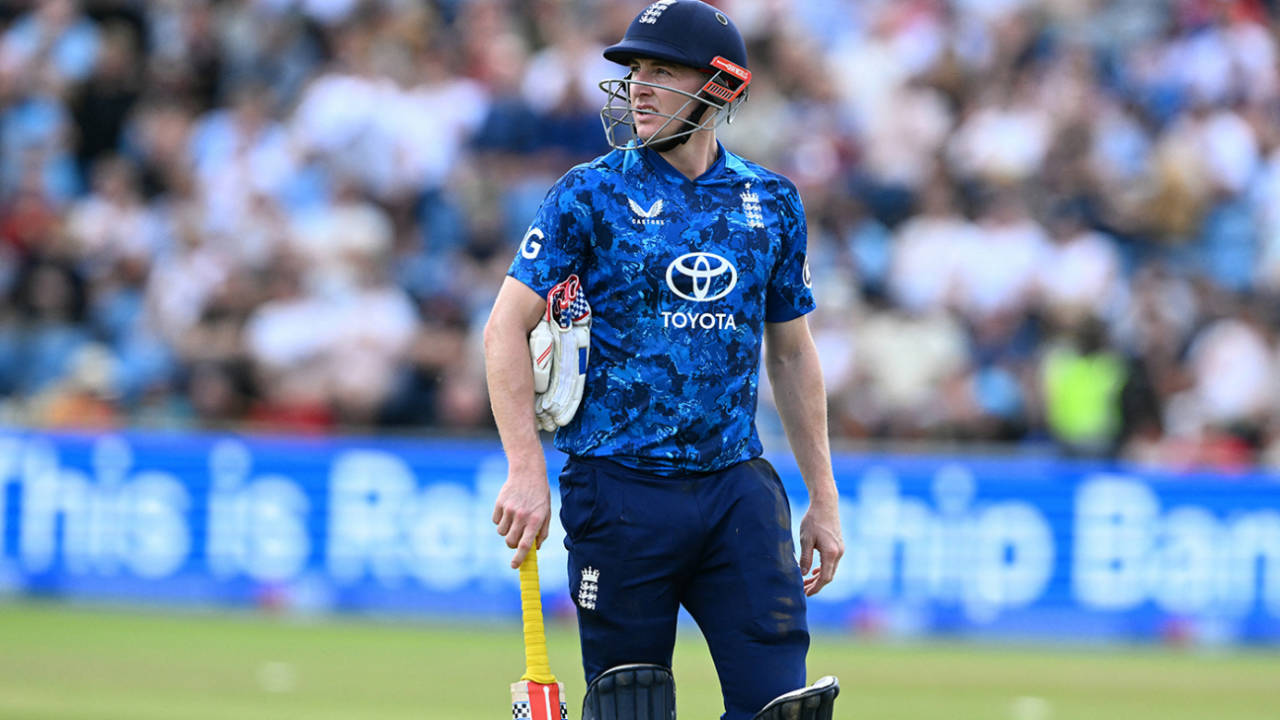Abject England still searching for one-day identity
Latest thrashing by South Africa underlines scale of challenge for Harry Brook and Brendon McCullum
Matt Roller
02-Sep-2025
Harry Brook's side were brought back down to earth by South Africa • AFP/Getty Images
If the margin was an aberration, then the result itself was not. England were utterly thrashed at Headingley as South Africa cruised home with 175 balls to spare, their seventh defeat in 10 ODIs this year and their 20th loss in 30 matches since the start of the last World Cup. Harry Brook said it was "just a bad day" but England have had far too many of them in this format.
This was an abject performance, characterised by a collapse of 7 for 29 to slide from 102 for 3 to 131 all out. Sonny Baker conceded 76 runs in seven wicketless overs, the most expensive figures for an England debutant, and the chase barely lasted long enough for the floodlights to come on. The crowd had long since thinned out by the time Dewald Brevis hit the winning six.
For Brook, this was a reality check after starting his tenure as white-ball captain with a clean sweep against West Indies in June. South Africa were far stronger opponents, and have now hammered England in three consecutive ODIs: this was worse than the car-crash in Karachi at the Champions Trophy, though still someway short of the Mumbai mauling at the 2023 World Cup.
The fans who stuck it out to the bitter end cheered sarcastically as Adil Rashid took two cheap wickets with the scores level, but left feeling short-changed. "It's not good enough," Brook said. "Nobody wants to come and watch that. I can't say much more than we've just had a bad day. We've got to put it behind us as quick as possible and move onto the next game."
Brook refused to blame England's lack of relevant preparation, but their build-up to this series was almost non-existent. Eight players trained at Headingley on Sunday, with seven - including Brook - missing due to their involvement in the Hundred's knockout stages, and the same number on Monday. Jamie Smith aside, their batters looked bereft of rhythm or confidence.
The contrast with South Africa's preparation was obvious, arriving in Leeds directly from Australia last week. They were faultless in the field - Aiden Markram and Ryan Rickelton took excellent catches, and Tristan Stubbs' sharp throw ran Brook out from deep cover - and looked every inch a side that had been playing international cricket for the last month.
But the last week alone cannot explain the wider pattern of England's sharp decline in ODI results. Once the team to beat in this format, they are now ranked eighth in the world - sandwiched between Afghanistan and West Indies - and this was a defeat that had all the hallmarks of the bad old days.
For Brendon McCullum, Markram's ultra-attacking innings in the run chase must have felt eerily familiar. Markram's 86 off 55 balls bore almost uncanny similarities to McCullum's 77 off 25 against England in Wellington a decade ago - right down to his merciless treatment of Baker, which evoked McCullum's disdainful takedown of Steven Finn.
England's problems did not stem from over-aggression but a more fundamental failing to adjust to the tempo of the format. Brook was run out looking for an unlikely second run in the 14th over while Jos Buttler, Jacob Bethell and Will Jacks' dismissals were about as soft as they come, all caught playing half-hearted, rotating shots rather than trying to hit boundaries.
"In my opinion, we probably could have gone a little bit harder with the bat and tried to put them under a little bit more pressure," Brook said. "The more positive you are and aggressive you are as a batter, sometimes you get away with more stuff." Markram's high-risk, high-reward approach served to underline his point.
But England consistently bat like a team unfamiliar with the demands of 50-over cricket, with batters grinding the clutch to jump between first gear and fifth but nothing in between; they have been bowled out in 15 of their last 30 ODIs. For all that they can blame their lack of exposure to the format, their top seven on Tuesday had more than 15,000 ODI runs between them.
Concerned by the divergence between formats, they have made an overcorrection. They picked seven players on Thursday who had featured in a gruelling Test series against India, six of whom had then gone straight into the Hundred and looked worn down by their heavy workloads. Somehow, they managed to look short of rhythm and overcooked simultaneously.
England were too slow to evolve after their 2019 triumph, changing captains three years into a four-year cycle between World Cups. They were understandably reluctant to move on from a golden generation of white-ball players, and paid a high price with a humbling group-stage exit in 2023 which marked the final chapter for several players' ODI careers.
The trouble is that they do not appear to have learned from those errors. They are halfway through another four-year cycle but have no clear identity as a team beyond a deep batting line-up. Brook's repeated clichés about putting bowlers under pressure and trying to take wickets do not equate to a philosophy, nor an actual gameplan
England have two chances this week - at Lord's on Thursday, then in Southampton on Sunday - to prove that criticism wrong, and perhaps it is unfair to judge them too harshly after one off-day. But for a team that only two years ago were defending champions in both white-ball formats, days like this have become uncomfortably familiar.
Matt Roller is senior correspondent at ESPNcricinfo. @mroller98

